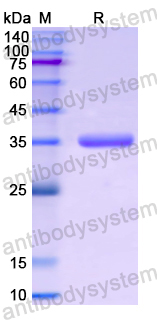Catalog No.
YHJ56401
Expression system
E. coli
Species
Homo sapiens (Human)
Protein length
Ser41-Cys339
Predicted molecular weight
35.56 kDa
Nature
Recombinant
Endotoxin level
Please contact with the lab for this information.
Purity
>90% as determined by SDS-PAGE.
Accession
Q9H3D4
Applications
ELISA, Immunogen, SDS-PAGE, WB, Bioactivity testing in progress
Form
Lyophilized
Storage buffer
Lyophilized from a solution in PBS pH 7.4, 0.02% NLS, 1mM EDTA, 4% Trehalose, 1% Mannitol.
Reconstitution
Reconstitute in sterile water for a stock solution. A copy of datasheet will be provided with the products, please refer to it for details.
Shipping
In general, proteins are provided as lyophilized powder/frozen liquid. They are shipped out with dry ice/blue ice unless customers require otherwise.
Stability and Storage
Use a manual defrost freezer and avoid repeated freeze thaw cycles. Store at 2 to 8°C for frequent use. Store at -20 to -80°C for twelve months from the date of receipt.
Alternative Names
Keratinocyte transcription factor KET, P63, KET, Tumor protein p73-like, p63, P73L, CUSP, P73H, p40, Tumor protein 63, TP73L, Transformation-related protein 63, TP63, Chronic ulcerative stomatitis protein, p73L, p51
Decursin Suppresses Esophageal Squamous Cell Carcinoma Progression via Orchestrated Cell Cycle Deceleration, Apoptotic Activation, and Oncoprotein Degradation., PMID:40508204
Identification of Genomic Structural Variations in Xinjiang Brown Cattle by Deep Sequencing and Their Association with Body Conformation Traits., PMID:40508044
Ankyloblepharon-Ectodermal Defects-Cleft Lip/Palate Syndrome-Linked p63 Mutations Disrupt Keratinocyte Proliferation and Survival Through Oxidative Stress and Impaired Slc7a11 Expression., PMID:40508040
DNA methylation patterns in breast cancer, paired benign tissue from ipsilateral and contralateral breast, and healthy controls., PMID:40500734
Functional Characterization of LTR12C as Regulators of Germ-Cell-Associated TA-p63 in U87-MG and T98-G In Vitro Models., PMID:40498028
KRT5high TP63-expressing urothelial basal cells act as a driver to bladder urothelium regeneration in rabbit., PMID:40483513
The E3 ligase TRIM21 promotes progression of pancreatic ductal adenocarcinoma by down-regulating TAp63α and derepressing IL20RB., PMID:40460193
Multidimensional Evidence Chain of Nutritional Impact on Digestive System Tumors: Integration of Mendelian Randomization Causal Inference, NHANES Epidemiological Data, and Transcriptomic Analysis., PMID:40415396
RHOA-associated disorder can be non-mosaic., PMID:40414526
Generation of a biliary tract cancer cell line atlas identifies molecular subtypes and therapeutic targets., PMID:40353839
The Functional Impact of the Noncoding SNP rs3741442 on Orofacial Clefting., PMID:40353495
Effects of n-Myc and c-Myc on the expression of p53 family members and their transcriptional targets in human neuroblastoma cells., PMID:40349458
Dysregulation of MYBL2 impairs extravillous trophoblast lineage development and function, contributing to recurrent spontaneous abortion., PMID:40294258
ATF6α inhibits ΔNp63α expression to promote breast cancer metastasis by the GRP78-AKT1-FOXO3a signaling., PMID:40223122
Primary Cutaneous Anaplastic Large Cell Lymphoma With TCR-γδ Expression: A Case Series of Eleven Patients of a Rare Immunophenotypic Variant., PMID:40202044
GRHL3 specifically initiated by the TP63 transcription factor promotes the metastasis of squamous cell carcinogenesis., PMID:40199449
The interaction between ΔNp63α and TAp63α, mediated by miR-205-5p, inhibits the migration of lung adenocarcinoma cells., PMID:40181048
Two distinct durable human class-switched memory B cell populations are induced by vaccination and infection., PMID:40173042
Interplay and cooperation between GLI2 and master transcription factors promote progression of esophageal squamous cell carcinoma., PMID:40157366
Airway basal stem cell-derived extracellular vesicles modulate proliferation, migration and collagen deposition of fibroblasts., PMID:40102996
A Study of Immunohistochemical Expression of p63 in Colorectal Carcinoma., PMID:40091472
iModEst: disentangling -omic impacts on gene expression variation across genes and tissues., PMID:40041206
PPP1R13L drives cervical cancer progression by suppressing p63-mediated PTEN transcription., PMID:40014097
Uncovering potential molecular markers and pathological mechanisms of Parkinson's disease and myocardial infarction based on bioinformatics analysis., PMID:39973855
Identification of biomarkers and mechanism exploration of ferroptosis related genes regulated by m6A in type 2 diabetes mellitus., PMID:39966875
Anti-Cancer Bioactive Peptide Induces Apoptosis in Gastric Cancer Cells through TP53 Signaling Cascade., PMID:39950267
Nucleosome binding by TP53, TP63, and TP73 is determined by the composition, accessibility, and helical orientation of their binding sites., PMID:39929723
TAp63γ is the primary isoform of TP63 for tumor suppression but not development., PMID:39915463
Molecular characterization of a rare TP63 variant associated with split-hand/split-foot malformation 4 and incomplete penetrance: disruption of the p63-Dlx signaling pathway., PMID:39910461
Computational network analysis of two popular skin cancers provides insights into the molecular mechanisms and reveals common therapeutic targets., PMID:39866430
Targeting aldehyde dehydrogenase ALDH3A1 increases ferroptosis vulnerability in squamous cancer., PMID:39863749
Anthracyclines disaggregate and restore mutant p63 function: a potential therapeutic approach for AEC syndrome., PMID:39863572
Extraction of coronary thrombus-derived exosomes from patients with acute myocardial infarction and its effect on the function of adventitial cells., PMID:39820800
p63: A Master Regulator at the Crossroads Between Development, Senescence, Aging, and Cancer., PMID:39791744
Alternative splicing in the DBD linker region of p63 modulates binding to DNA and iASPP in vitro., PMID:39762243
circTP63-N suppresses the proliferation and metastasis of nasopharyngeal carcinoma via engaging with HSP90AB1 to modulate the YAP1/Hippo signaling pathway., PMID:39754006
Effect of ΔNp63β on cell cycle and apoptosis in T98G cells., PMID:39734355
Unraveling the Genetic Basis of Congenital Limb Anomalies in Eight Families., PMID:39639541
TIP60 enhances cisplatin resistance via regulating ΔNp63α acetylation in SCC., PMID:39627186
BRD4 sustains p63 transcriptional program in keratinocytes., PMID:39605045
The Development of a Human Respiratory Mucosa-on-a-Chip Using Human Turbinate-Derived Mesenchymal Stem Cells., PMID:39596928
Combining tissue biomarkers with mpMRI to diagnose clinically significant prostate cancer. Analysis of 21 biomarkers in the PICTURE study., PMID:39578642
Crosstalk between paralogs and isoforms influences p63-dependent regulatory element activity., PMID:39565223
p63 affects distinct metabolic pathways during keratinocyte senescence, evaluated by metabolomic profile and gene expression analysis., PMID:39543093
ΔNp63α promotes radioresistance in esophageal squamous cell carcinoma through the PLEC-KEAP1-NRF2 feedback loop., PMID:39500864
Expression-Driven Genetic Dependency Reveals Targets for Precision Medicine., PMID:39484404
NLRP10 maintains epidermal homeostasis by promoting keratinocyte survival and P63-dependent differentiation and barrier function., PMID:39424623
Chromatin interaction maps identify oncogenic targets of enhancer duplications in cancer., PMID:39424324
Systemic ALK-negative anaplastic large cell lymphoma: Insights into morphologic, immunophenotypic, genetic and molecular characteristics., PMID:39424106
A Rare Case of TP63-Associated Lymphopenia Revealed by Newborn Screening Using TREC., PMID:39409174

